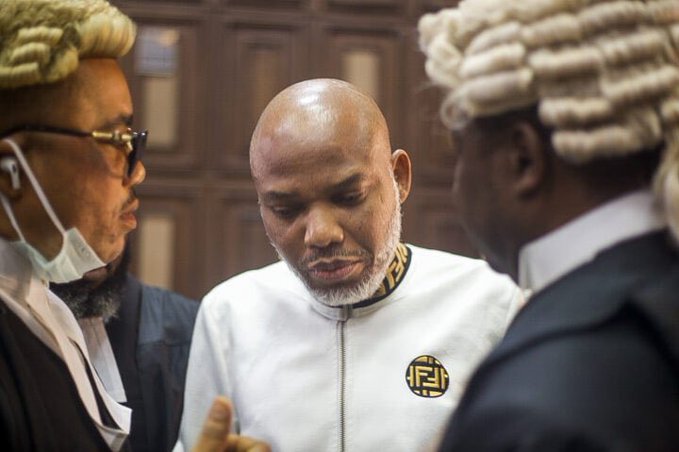The Court of Appeal Abuja Division on Friday struck out an appeal by Nnamdi Kanu, ruling that the case had lost relevance after his life imprisonment sentence.
Kanu had asked the appellate court to review allegations that security and government authorities violated his constitutional rights while he was detained by the Department of State Services.
A three-member panel of the court held that the appeal had no legal weight and was now purely academic, given his conviction by the Federal High Court in Abuja on November 20.
In the lead judgment, Justice Justice Boloukuromo Ugo said Kanu’s claims on access to healthcare and other personal liberties could no longer be adjudicated, noting that the appellant was no longer in DSS custody when the appeal started.
Kanu’s lawyer, Maxwell Maxwell Opara, had told the court that his client was being held at the Sokoto Sokoto Correctional Centre, rendering his request for transfer from security custody to Kuje prison meaningless.
The judge added that Kanu had previously expressed preference for prison custody, meaning the prayers sought had already been overtaken by events following the sentencing.
Kanu’s appeal stemmed from a July 3 judgment by retired Federal High Court judge Justice Justice Taiwo Taiwo, who dismissed his fundamental rights suit for lack of proof.
The original case was filed in December 2021 and marked FHC/ABJ/CS/1585/2021, where Kanu alleged that his health worsened while in DSS care, and that medical officers attending to him were unqualified.
DSS counsel, Idowu Awo, had challenged the claims, arguing that Opara presented nothing to show the personnel were “quacks,” and insisted that no evidence was tendered to prove medical negligence.
The Federal Government’s counsel, Simon Simon Enoch, had also urged the court to dismiss the appeal.
At the trial court, Justice Taiwo held that while detainees had the right to worship, such practice “must not infringe on the rights or peace of others in custody” after Kanu failed to substantiate claims that his religious freedoms were denied.
On the medical negligence claim, the judge noted the absence of expert testimony, saying the appellant did not call any certified medical professional to validate the allegations.
The Federal High Court later dismissed the case “for lacking in merit,” a decision now upheld by the appellate court, which affirmed that the matter could no longer proceed under the laws governing rights-enforcement suits.



